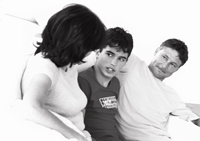Archived Content
The National Institute of Mental Health archives materials that are over 4 years old and no longer being updated. The content on this page is provided for historical reference purposes only and may not reflect current knowledge or information.
Adolescents with Depression Not Harmed in Studies Using Placebo
• Science Update

Teens with depression who initially are randomly assigned to placebo treatment (inactive pill) during a trial are no more likely to experience harm or have a diminished response to subsequent active treatments than teens who are initially randomized to active treatment, according to an analysis of data from the NIMH-funded Treatment for Adolescents with Depression Study (TADS). The study was published online ahead of print January 15, 2009, in the American Journal of Psychiatry.
BackgroundThe TADS team randomly assigned 439 adolescents aged 12 to 17 to one of four treatment strategies for 36 weeks —the antidepressant fluoxetine only, cognitive behavioral therapy (CBT) only, the combination of the two, or placebo. TADS results can be found here.
The group that received placebo was then offered the TADS treatment of their choice after the first 12 weeks of the trial and treated openly. For this analysis, Betsy Kennard, Psy.D., of the University of Texas Southwestern Medical Center in Dallas, and colleagues compared the outcome of the “placebo/open group” to that of the active treatment groups combined to determine if the placebo treatment or the delay in getting active treatment affected the teens’ long-term benefits. They also aimed to determine if the teens responded differently to subsequent active treatment than the groups who had been treated with active treatments throughout the study.
Results of the StudyAt the end of the 36-week trial, 82 percent of the placebo/open group had responded to active treatment, compared to 83 percent of those in the active treatment groups. About 48 percent of the placebo/open group achieved remission, compared to 59 percent of the active group. The difference in remission rates was not statistically significant, but the researchers suggest that the small difference likely resulted because the active treatment group received treatment for a longer period of time than the placebo/open group.
Rates of worsening symptoms or adverse events such as suicidal thinking and behavior did not differ between the placebo/open group and the active treatment group. In addition, neither group was more likely to discontinue treatment compared to the other.
SignificanceScientists know little about the long-term outcomes of placebo treatment in pediatric antidepressant trials, leading to concerns about the impact of delaying active treatment with the use of placebo. However, a placebo-controlled study provides value by helping researchers better differentiate among treatments and treatment responses.
This study helped researchers conclude that 12 weeks of placebo does not cause harm for teens with depression, nor does it reduce the rate of response when the teens are given subsequent active treatments. Moreover, 73 percent of placebo participants elected to receive active, open treatment after the first 12 weeks, suggesting that participants are not reluctant to seek additional treatment after participating in a placebo condition.
The lack of difference in adverse events and drop-out rates also suggests that teens are able to tolerate placebo treatment and the potential waiting period before receiving active treatment without experiencing significant worsening of symptoms. The researchers conclude that the use of placebo for this amount of time is ethical, and the risk of harm in delaying active treatment is low.
What’s NextPlacebo-controlled trials will continue to be an important and acceptable research tool for establishing the safety and effectiveness of new interventions for teens with major depression.
Reference
Kennard BD, Silva SG, Mayes TL, Rohde P, Hughes JL, Vitiello B, Kratochvil CJ, Curry JF, Emslie GJ, Reinecke M, March J. Is initial treatment with placebo harmful to depressed adolescents? Outcomes from the Treatment for Adolescents with Depression Study (TADS). American Journal of Psychiatry. Online ahead of print January 15, 2009.
